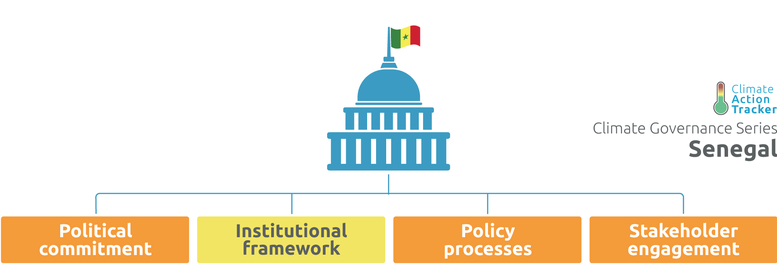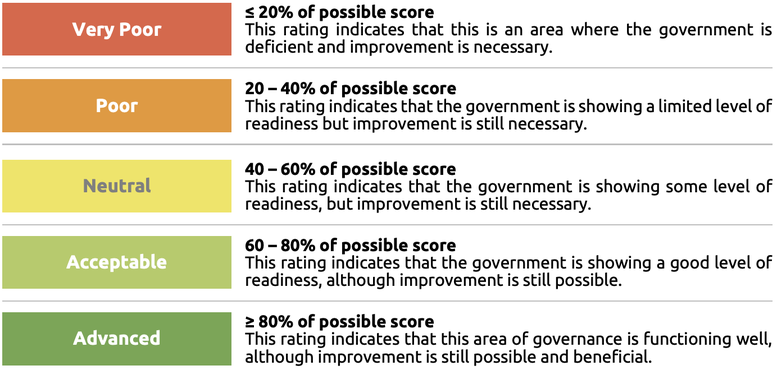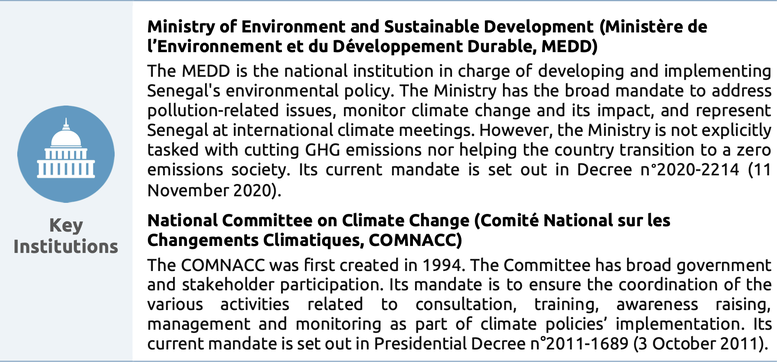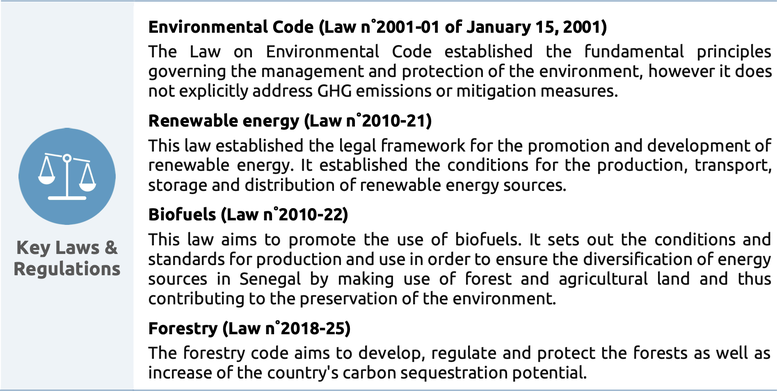Climate Governance in Senegal
Attachments

Cette analyse est également disponible en français.
The CAT Climate Governance series seeks to produce a practical framework for assessing a government’s readiness - both from an institutional and governance point of view - to ratchet up climate policy and implement adequate transformational policies on the ground, to enable the required economy-wide transformation towards a zero emissions society.

Our methodology
We have set up a framework that assesses and scores a number of indicators, where we rate various aspects of governance. This allows us to establish a common basis on which to compare climate governance across countries as well as identify areas of improvement and highlight positive developments. We have applied this framework at a national level only.
For more detail on our methodology, see here: methodology page.
Assessment of national level readiness
Senegal’s government is committed to developing its oil and gas fields. President Macky Sall has openly opposed international efforts to limit financing for fossil fuel development. While the government sees adaptation and resilience, especially in the agriculture sector, as the priority, it pays little attention to the need to decarbonise.
Senegal is progressing in implementing its climate policy. The government has made progress on deploying renewable energy and expanding public transportation. It has also abandoned plans to further develop coal-fired power generation, although continues to pursue its ‘gas to power’ strategy to shift its electricity production from largely heavy oil fuel to fossil gas. It is unclear whether President Sall will run again in 2024; however, it is unlikely that a change in government would lead to significant changes in climate policy or fossil gas development plans.
The government has made some effort to fight corruption. However, this effort has stalled or even reversed in recent years. There are allegations of corruption regarding some of Senegal’s oil and gas deals and in the forestry sector. This may undermine public trust in the government’s ability to deliver on its promises around transition-related actions.
The National Committee on Climate Change (COMNACC) coordinates climate action in Senegal. While COMNACC likely ensures that there is broad coordination amongst relevant players nationally, the extent to which it ensures focused inter-ministerial coordination is questionable, given its broad stakeholder participation. Senegal does not have a dedicated inter-ministerial entity that focused on transition related action.
As a result of the limited effective coordination of climate action, the need to transition to a zero emissions society has not been mainstreamed into sectoral policies. While reference to Senegal’s NDC or other mitigation measures can be found in some sectoral policies, there is a lack of strategies encompassing all transition-related issues in a given sector. Actions are fragmented between and within ministries.
Senegal does not have an authoritative body with an explicit and clear mandate to provide climate or energy transition-related advice to the government, though some agencies do advise the government on mitigation-related matters and may be capable of playing such a role.
Senegal has a good level of climate finance preparedness in some areas, like mobilising international climate finance. However, other areas, such as incorporating climate considerations into its domestic budget processes, still need work. More broadly, resource constraints are an issue and limit the ability of key institutional players to act.
Senegal does not have comprehensive climate change legislation, though it does have some climate- relevant, sector-specific legislation. The country has not adopted a net zero target and some of its current plans, like shifting to fossil gas in its power sector, are inconsistent with a 1.5°C compatible pathway. The government did start to prepare its long-term low-carbon development strategy in March 2022. Hopefully, the long-term plan will help the country bring its short-term mitigation efforts into greater alignment with a decarbonisation pathway.
The government of Senegal is in the process of developing a transparency framework. A project from the Initiative for Climate Action Transparency (ICAT) led to the proposition of a national MRV system and the preparation of a roadmap for its implementation. Senegal does not have a formal review nor ratchet-up mechanism for evaluating and enhancing climate action. However, it does have some monitoring and evaluation functions as part of its broader planning process, both within the Ministry of Environment and Sustainable Development (Ministère de l’Environnement et du Développement Durable, MEDD) and across the government more generally.
Seeking broad buy-in for Senegal’s transition-related policies and projects is limited. Stakeholder consultation occurs regularly, but there are questions around its effectiveness. Public views are not often taken into consideration in the development of policies, and some fossil fuel projects, like the ill- fated Sendou coal fired power station, are implemented despite strong resistance from the population.
Senegal’s fossil gas expansion plans are inconsistent with a Just Transition and risk creating stranded assets and high levels of unemployment. The oil and gas sector likely has significant influence on the government, while the impact of the renewable energy sector, which is still in its infancy, is likely limited. Senegal is working on developing a roadmap for a Just Transition, as part of the Climate Action for Jobs Initiative.
Polling data suggests there is some public support for reducing emissions, but overall climate literacy is low. While the government is working on a strategy to integrate climate change into the curriculum, the focus of its strategy is only on adaptation.
Rating system

We analyse a number of different criteria of governance under four categories that cover the key enabling factors for effective climate action. We give each a rating as outlined above (very poor - poor - neutral - acceptable - advanced). For more detail on our methodology, click the link below.
Ratings and recommendations
The following section outlines the results of the analysis for each of the different categories and criteria as well as our recommendations for each category of governance.

- Strengthen the commitment of government officials from all relevant ministries to the transition, especially the need to accelerate the uptake of renewable energy;
- Ensure that all relevant ministries have a mandate to lead on zero emissions transition-related action.

- Strengthen coordination across line ministries and between the central government and local authorities in order to ensure sufficient inter-ministerial engagement;
- Strengthen the National Committee on Climate Change (COMNACC) through addressing its long-standing operational constraints;
- Establish a new, or mandate an existing, entity to provide transition related advice to the government;
- Strengthen efforts to mainstream the need for decarbonisation into sectoral policies;
- Continue efforts to improve access by government entities and non-state actors to climate finance;
- Increase the MEDD's budgetary allocation and implement a long-term programme to strengthen the Ministry's capacities;
- Establish a formal climate-budget tagging mechanism for the Ministry of Finance to support systematic integration of transition-oriented climate actions into the national budget.

- Adopt a long-term target for net zero emissions, with clear economy-wide and sectoral targets and milestones;
- Continue with efforts to develop a long-term low carbon development strategy;
- Establish a formal mechanism to integrate long-term zero emissions transition objectives into the design and implementation of short-term sectoral policies;
- Adopt a comprehensive climate change law or revise the environmental code to include clear provisions on emissions reduction targets;
- Continue with efforts to establish and strengthen the country’s transparency framework, including improving access to information online;
- Establish a formal ratchet up mechanism to scale up climate action in line with the Paris Agreement’s five-year cycle.

- Strengthen public awareness and outreach efforts around climate mitigation;
- Include climate change mitigation in the government’s education strategy;
- Improve existing stakeholder consultation mechanisms to ensure adequate public participation and buy-in;
- Stengthen efforts to ensure a just transition for all by adopting a comprehensive strategy and by addressing the issues of those negatively affected by the needs of transition.
Senegal's Climate Governance
These tables from the report give an overview and analysis of the key factors of Senegal's governance to enable effective climate action. We have looked at the country's key institutions, strategies, targets and legislation.




Stay informed
Subscribe to our newsletter